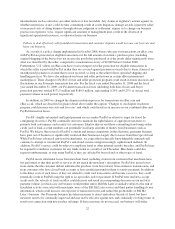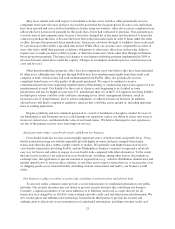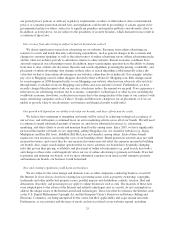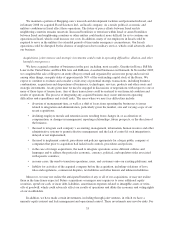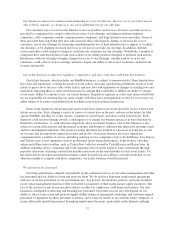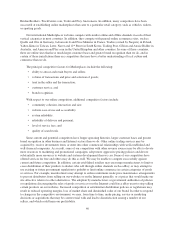eBay 2009 Annual Report Download - page 39
Download and view the complete annual report
Please find page 39 of the 2009 eBay annual report below. You can navigate through the pages in the report by either clicking on the pages listed below, or by using the keyword search tool below to find specific information within the annual report.Although our systems have been designed around industry-standard architectures to reduce downtime in the
event of outages or catastrophic occurrences, they remain vulnerable to damage or interruption from earthquakes,
floods, fires, power loss, telecommunication failures, terrorist attacks, computer viruses, computer
denial-of-service attacks, and similar events or disruptions. Some of our systems, including our Shopping.com
website and the systems related to the Bill Me Later business, are not fully redundant, and our disaster recovery
planning is not sufficient for all eventualities. Our systems are also subject to break-ins, sabotage, and intentional
acts of vandalism. Despite any precautions we may take, the occurrence of a natural disaster, a decision by any of
our third-party hosting providers to close a facility we use without adequate notice for financial or other reasons,
or other unanticipated problems at our hosting facilities could cause system interruptions, delays, and loss of
critical data, and result in lengthy interruptions in our services. We do not carry business interruption insurance
sufficient to compensate us for losses that may result from interruptions in our service as a result of system
failures.
There are many risks associated with our international operations.
Our international expansion has been rapid and our international business, especially in Germany and the
U.K., has also become critical to our revenues and profits. Net revenues outside the U.S. accounted for
approximately 54% of our net revenues in both fiscal year 2008 and 2009. Expansion into international markets
requires management attention and resources and requires us to localize our services to conform to local cultures,
standards, and policies. The commercial, Internet, and transportation infrastructure in lesser-developed countries
may make it more difficult for us to replicate our traditional Marketplace business model. In many countries, we
compete with local companies that understand the local market better than we do, and we may not benefit from
first-to-market advantages. We may not be successful in expanding into particular international markets or in
generating revenues from foreign operations. For example, in 2002 we withdrew our eBay marketplace offering
from the Japanese market, and in 2007 we contributed our business in China to a joint venture with a local
Chinese company. Even if we are successful in developing new markets, we often expect the costs of operating
new sites to exceed our net revenues for at least 12 months in most countries.
As we continue to expand internationally, including through the expansion of PayPal, Shopping.com, and
our classified businesses, we are increasingly subject to risks of doing business internationally, including the
following:
• strong local competitors;
• regulatory requirements, including regulation of Internet services, auctioneering, professional selling,
distance selling, privacy and data protection, banking, and money transmitting, that may limit or
prevent the offering of our services in some jurisdictions, prevent enforceable agreements between
sellers and buyers, prohibit the listing of certain categories of goods, require product changes, require
special licensure, subject us to various taxes, penalties or audits, or limit the transfer of information
between us and our affiliates;
• greater liability or legal uncertainty regarding our liability for the listings and other content provided by
our users, including uncertainty as a result of legal systems that are less developed with respect to the
Internet, unique local laws, conflicting court decisions and lack of clear precedent or applicable law;
• cultural ambivalence towards, or non-acceptance of, online trading;
• laws and business practices that favor local competitors or prohibit or limit foreign ownership of
certain businesses;
• difficulties in integrating with local payment providers, including banks, credit and debit card
networks, and electronic fund transfer systems;
• differing levels of retail distribution, shipping, and Internet infrastructures;
• different employee/employer relationships and the existence of workers’ councils and labor unions;
• difficulties in staffing and managing foreign operations;
31



